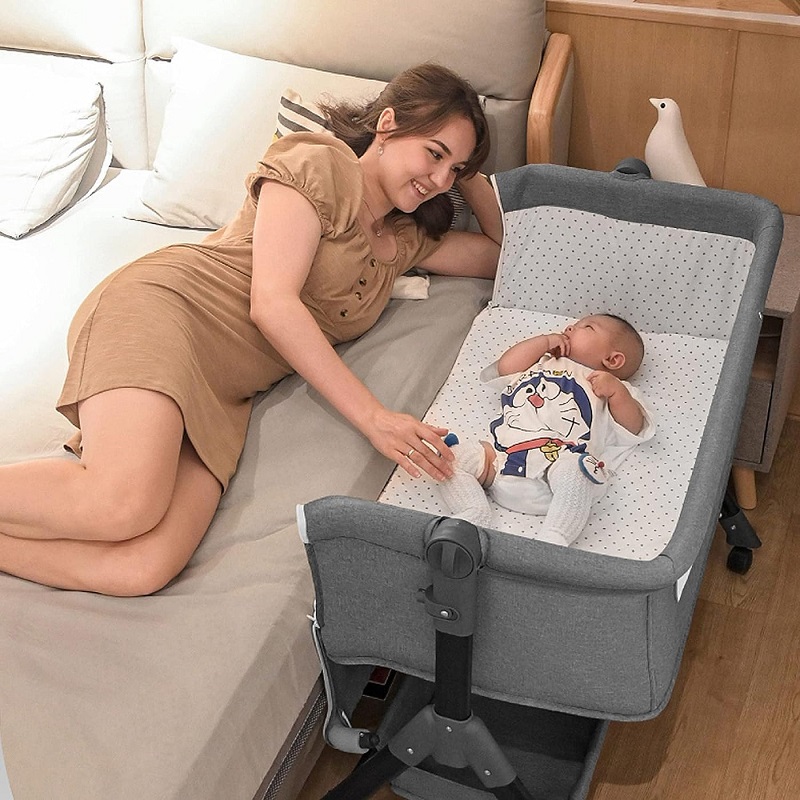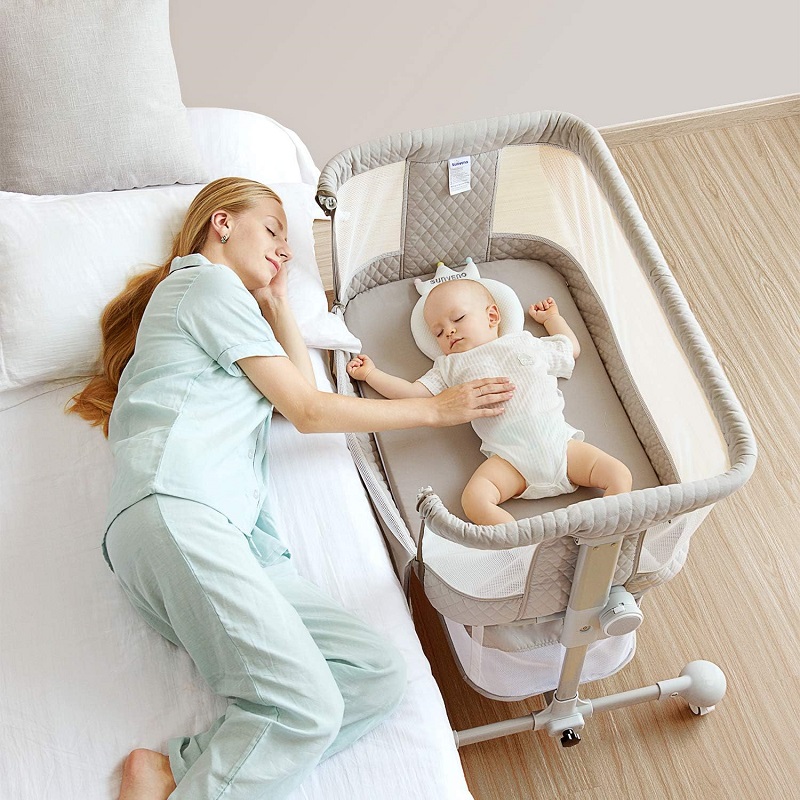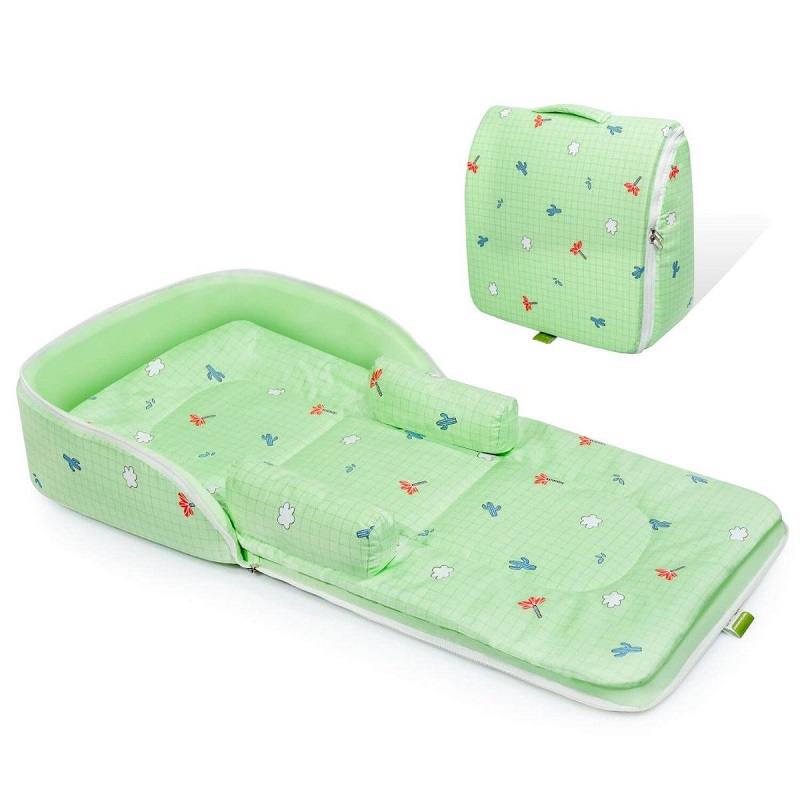Immediate Response to a Baby Falling From Bed
When a baby falls from bed, staying calm is crucial. First, check for visible injuries without moving the baby too much. Look for any signs of pain or discomfort as you gently assess them.
Assessing Your Baby for Injuries
Carefully examine the baby’s head for bumps or bruises. Also check their limbs and body for any signs of injury. Monitor their behavior, noting any changes, like excessive crying or drowsiness.
When to Call Emergency Services
Call 911 if the baby is unconscious, has trouble breathing, or has a serious wound. If the baby is vomiting repeatedly or having seizures, emergency services are needed.
Comfort and Observation After the Fall
If the baby seems alert, hold and soothe them. Keep an eye on the baby for the next few hours. Look for delayed signs of injury and ensure the baby can move all limbs normally.

Understanding the Possible Injuries
When a baby experiences a fall from bed, various injuries might occur. It’s important to understand these potential injuries to respond appropriately.
Signs of Concussion in Infants
A concussion is a brain injury caused by a bump or blow to the head. For babies, symptoms can include:
- Crying that won’t stop
- Vomiting
- Excessive sleepiness
- Refusal to eat
- Lack of interest in usual activities
Always see a doctor if you suspect your baby has a concussion.
Identifying a Scalp Injury
Scalp injuries often bleed a lot, which can be alarming. Look for:
- Cuts or lacerations on the head
- Swelling or bumps
Minor scalp injuries usually heal with home care, but deeper cuts may need medical attention.
Recognizing Symptoms of a Skull Fracture
Skull fractures are serious and require immediate medical care. Signs include:
- An indented area on the head
- Clear fluid draining from the nose or ears
- Swelling or bruising near the eyes or behind the ears
If these signs are present, go to the emergency room right away.
Indicators of a Serious Brain Injury
A serious brain injury can be life-threatening and needs urgent medical treatment. Symptoms might involve:
- Changes in consciousness or alertness
- Unusual breathing patterns
- Unequal pupil sizes
- Persistent vomiting
- Seizures
Don’t wait to see if these symptoms improve. Get emergency help immediately.

Emergency Care and Medical Attention
Situations That Require Immediate ER Visits
Serious falls may need emergency room (ER) attention. Here are situations warranting a rush to the ER:
- Baby shows signs of severe head injury or fractured skull.
- Baby becomes unconscious or semi-conscious.
- Clear fluid or blood leaks from ears or nose.
- Baby has uneven pupil sizes or sees differently.
- Loose consciousness accompanied by long-term drowsiness or confusion.
Always remember, if in doubt, it’s safer to have an ER evaluation.
Symptoms That Demand Urgent Care Consultation
Sometimes symptoms are less clear but still need quick care. Take your baby to urgent care if they exhibit:
- Unrelenting crying that’s not usual for them.
- Persistent vomiting beyond mild nausea.
- Any change in baby’s mobility or alertness.
- Altered sleeping or eating habits post-fall.
- Signs of pain like constant rubbing of a spot.
Quick action ensures your baby’s safety and good health.
Long-Term Monitoring Following a Fall
After an initial checkup, keep monitoring your baby. Look out for delayed symptoms:
- Changes in baby’s mood or behavior.
- Loss of skills they recently mastered.
- Any signs of strain while moving.
- Unusual quietness or irritability.
Monitoring should continue for a few days post-fall to ensure no hidden issues arise.
Home Care for Minor Injuries
If your baby experiences a minor fall, simple home care can suffice. Make sure to clean any cuts with gentle pressure to stop bleeding. For swelling, apply a cold compress.
How to Administer Home Treatments
When treating minor injuries at home, always wash your hands first. Use clean, soft cloth to wipe away any blood. If there’s a bump, hold a cold pack to it for 20 minutes.
When to Allow Rest and Sleep
After a fall, it’s natural for a baby to want to rest. Watching for changes during their sleep is key. Wake them gently every few hours to check their condition.
Pain Management for Your Baby
To ease pain from bumps or bruises, you can offer a teething ring or cool spoon. If discomfort persists, and your baby is old enough, give the correct dose of acetaminophen. Consult your doctor before giving pain medication.

Prevention of Future Falls
Preventing falls is key to keeping babies safe. Take steps around your home to reduce risks.
Baby-Proofing Tips for the Home
Start by securing furniture that can tip over. Use corner guards on sharp edges. Install safety gates at stairs and doorways. Keep floors clear of small objects babies might trip over. Remove loose rugs or secure them firmly to the floor.
Ensuring Safety in Baby’s Play Area
In the play area, ensure all toys are age-appropriate and free of sharp parts. Place soft mats or carpets to cushion any falls. Keep the play area away from windows, stairs, and heavy furniture that could topple.
Reducing Risks of High-Place Falls
Never leave a baby unattended on high surfaces like baby bed, changing tables, or sofas. Always buckle babies into highchairs, strollers, and other seating with safety straps. Avoid using baby walkers; they can lead to serious falls. Ensure crib sides are always locked and the mattress is set to the correct height as the baby grows.
When to Seek Professional Advice
After a baby’s fall from baby bed, watching for any changes is key. It’s essential to know when it’s time to get professional help.
Changes in Behavior Post-Fall
Look for unusual behavior changes after a fall. Watch if your baby is less active or not playing as usual. If they’re not smiling or laughing as they typically would, it’s wise to consult a doctor.
Persistent Symptoms After Initial Care
If symptoms like crying, fussiness, or sleep issues persist after home care, seek advice. Pay attention to whether your baby is eating less or showing signs of pain. A healthcare provider can help judge if these are warning signs.
Utilizing Healthcare Providers for Peace of Mind
Even if injuries seem minor, checking with a doctor can offer peace of mind. They can ensure that no hidden issues are missed, especially with head injuries. If you’re ever unsure, it’s better to call your pediatrician or head to the clinic.
Signs of Serious Injury
If your baby exhibits any of the following signs after a fall, it’s crucial to seek immediate medical attention:
- Loss of Consciousness: If your baby loses consciousness, even briefly, this is a red flag.
- Severe Crying or Irritability: Excessive crying that cannot be soothed may indicate pain or distress.
- Vomiting: Repeated vomiting after a fall can be a sign of a concussion or other serious injury.
- Difficulty Walking or Crawling: If your baby struggles to move or seems uncoordinated, this warrants a check-up.
- Unusual Breathing Patterns: Any changes in breathing, whether rapid, shallow, or labored, should be evaluated.
Monitoring for Concussion Symptoms
Concussions can be tricky to identify in infants and toddlers. Look for:
- Changes in Alertness: If your baby seems unusually drowsy or less responsive.
- Irritability or Mood Swings: Increased fussiness or changes in temperament can be concerning.
- Balance Issues: Difficulty maintaining balance while sitting or standing can indicate a problem.
Importance of Follow-Up Care
Even if the initial assessment does not reveal any serious injuries, follow-up visits may be necessary.
- Regular Monitoring: Keep an eye on your baby’s progress over the next few days. Changes in behavior, eating habits, or sleep patterns should prompt another consultation.
- Pediatrician’s Guidance: Your pediatrician may recommend specific observations or activities to ensure your baby recovers fully.
Trusting Your Instincts
As a parent, trusting your instincts is vital. If something feels off about your baby’s behavior or well-being after a fall, don’t hesitate to reach out for professional help. Early intervention can make a significant difference in outcomes.
